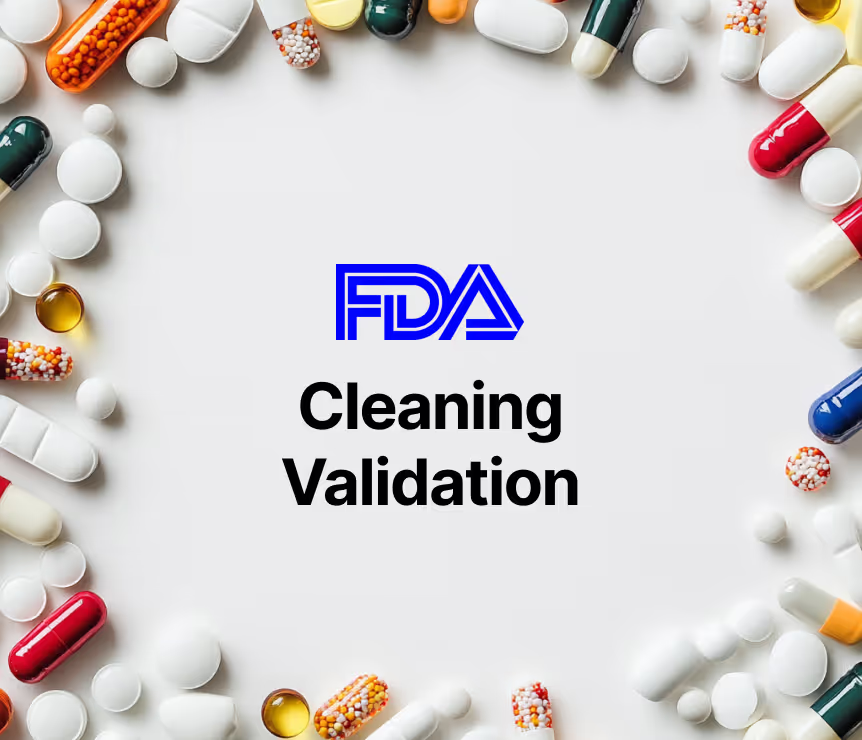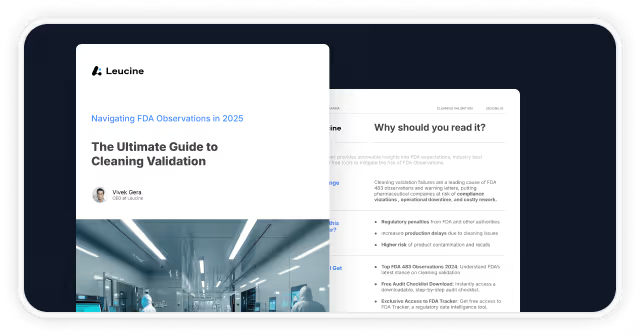The Complete Guide to FDA Inspection Readiness in 2025
Be inspection-ready every day. Download the FDA checklist and build a system that earns confidence—not citations—during your next audit.

Why Inspection Readiness Matters More Than Ever
As FDA inspections become more risk-based and data-driven, organizations must adopt a proactive approach to ensure compliance. Inspection readiness is no longer a project—it is a continuous state of preparedness woven into your quality management system (QMS). Whether you're producing drugs, medical devices, or conducting clinical trials, readiness determines whether you're meeting regulatory expectations and protecting patient safety.
In this guide, you'll learn:
- How to build and sustain an inspection readiness program
- What regulatory authorities expect during surveillance inspections and for-cause inspections
- Why your documentation, training, and processes must support product quality and data integrity
- How to use our FDA inspection checklist to evaluate your current systems
What Is Inspection Readiness?
Inspection readiness means your systems, documentation, and people are always prepared for audits conducted by FDA personnel or other regulators. It means that during an inspection day, you don’t scramble—you operate with confidence.
True readiness is built on:
- A reliable and traceable document management process
- Well-trained staff who understand their roles and responsibilities
- A QMS designed to meet evolving regulatory guidelines
- Monitoring systems and risk assessments that anticipate rather than react
Core Elements of a Strong Inspection Readiness Strategy
1. Operationalize Inspection Readiness
- Make inspection readiness part of daily operations—not a periodic event.
- Conduct internal audits and mock inspections regularly to uncover weaknesses.
- Use key metrics to track continuous improvement and readiness trends.
2. Strengthen Documentation and Data Integrity
- Ensure documents are controlled, versioned, and easy to retrieve.
- Maintain traceability across SOPs, batch records, deviations, and CAPAs.
- Link all source documents and submitted data to support compliance narratives.
3. Train and Empower Your Inspection Team
- Build an experienced inspection team with a designated inspection coordinator.
- Train SMEs not just on procedures, but on regulatory context.
- Practice interview scenarios through mock inspections to build clarity and confidence.
4. Prepare the Physical and Digital Environment
- Designate a war room and back room setup to manage inspection flow.
- Maintain clean, inspection-ready facilities with up-to-date calibration and validation.
- Ensure access controls and audit trails are functional across digital systems.
5. Include Suppliers in Your Inspection Readiness Program
- Conduct supplier audits and evaluate compliance documentation regularly.
- Integrate contract management and quality agreements into your QMS.
- Monitor third-party risk through trend analysis and findings.
What Happens on Inspection Day?
FDA inspections test not just systems—but people, culture, and confidence. Here’s how to prepare:
The First Hour Sets the Tone
- Verify inspector credentials (look for .gov email and U.S. flag badge)
- Activate your inspection team and log document requests
- Create a welcoming but controlled environment
Managing Requests and Responses
- Use a document tracker to manage requested files and response times
- Implement a review-before-release system
- Keep your inspection coordinator in constant communication with the back room
Effective Communication Techniques
- Ensure employees understand their role in inspections
- Coach teams to answer based on facts—not speculation
- Avoid defensive or incomplete answers; focus on clarity
After the Inspection: Turning Observations into Action
Inspection follow-up is where many organizations succeed—or fail. Treat observations as insight into potential issues.
Step 1: Document Everything
- Record all verbal and written comments from the inspector
- Review documentation for consistency and gaps
Step 2: Root Cause and CAPA
- Conduct root cause analysis for each observation
- Identify systemic breakdowns and implement corrective actions
- Document preventive actions tied to findings
Step 3: Sustain Improvements
- Schedule post-inspection training
- Reassess your inspection readiness program based on lessons learned
- Monitor progress and effectiveness over time
How FDA Tracker Supports Inspection Readiness
FDA Tracker is a free powerful inspection intelligence platform designed to support regulatory compliance across your organization. It helps you:
- Analyze 483 observations and trends across product categories
- Profile FDA investigators and track behavioral patterns
- Benchmark inspection outcomes across facilities
- Identify high-risk subsystems based on recent findings
- Prepare for inspections with real-world data from regulatory actions
Whether you're preparing for surveillance inspections, for-cause inspections, or pre-approval inspections, FDA Tracker enhances your ability to plan, train, and respond with confidence.
With FDA Tracker, you can:
- Align SOPs and processes to observed conditions
- Identify and resolve weak points before inspection day
- Train teams using relevant, recent data
- Build inspection readiness that lasts
Signup for Free on FDA Tracker to stay audit ready
Download the FDA Inspection Readiness Checklist
Use our checklist to:
- Evaluate documentation, training, and compliance systems
- Identify risks and implement preventive actions
- Get your inspection team prepared ahead of time
Download the FDA Inspection Checklist on FDA Tracker and move toward a smarter, more resilient inspection readiness strategy.


















